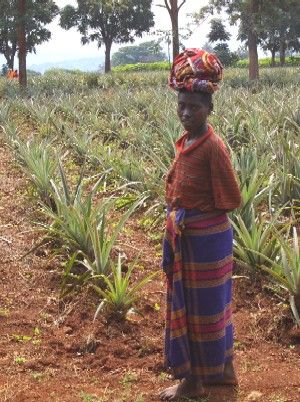The Same … Yet Different

Last weekend, I was privileged to visit the new salsa garden at Camp Allen as part of the “Rooted and Connected” Christian Formation conference of the Episcopal Diocese of Texas. I was struck by how similar it looked to the new garden just planted in my hometown in Tennessee by the Episcopal School of Knoxville. Both have neat raised beds, green peppers ready for harvest, paths wide enough for visitors, and fences to keep out the critters.
A fifth-grade class I led last week had a similar experience, but the garden they “visited” was in Burundi. As part of the curriculum I’m teaching – the Abundant Life Garden Project by Episcopal Relief & Development – we viewed a video showing a community garden in the Diocese of Makamba, narrated by the Rt. Rev. Martin Nyaboho. This film showed parishioners there clearing fields for their garden and planting seeds for new crops, much as we had done just a few weeks before.
When asked simply, “What are your reactions?” the fifth graders engaged in an hour-long discussion of the commonalities of our garden work here in Knoxville and the efforts in Burundi – clearing previously unused land for cultivation, planting seeds, weeding and harvesting. The kids were aghast (but jealous, I think) that children in Burundi got to work with “real machetes!” and intrigued that people of all ages worked alongside each other in the garden – something, sadly, they may not see here in America.
Yet the children also picked up on some vital differences between their situation and that in Burundi. Many of them were surprised to see poverty firsthand. They noted that while here in Tennessee, we might go out and buy a tractor or at least a weed eater to assist us in our farming, those options might not be possible in other parts of the world. A quiet and thoughtful young man sitting off to the side wondered how people might still go hungry even if they have good soil and can grow crops.
That’s an excellent, excellent question, I replied. And I tried very hard to identify some of the causes of hunger and challenges faced by countries in sub-Saharan Africa, and to gently explain in age-appropriate terms some of the harsh realities those in Burundi might face.
There are no easy answers to this question. But I’m glad this young man asked it. I’m glad the children asked, “Where exactly IS Burundi?” and had me pull out a map and find this small country. I’m glad they noted both the commonalities and the differences between our two countries.
Before we serve others, we really do have to seek them out. Before we can treat each and every person as a child of God and approach them with dignity and respect, we need to find out who they are and maybe even ask the question, “Why?”
———-
Cynthia Coe is a Christian formation consultant, a member of the Episcopal Diocese of East Tennessee Christian Formation Team, and writer of the Abundant Life Garden Project, a children’s curriculum by Episcopal Relief & Development.
Photo: A child tending a plot in Burundi.


